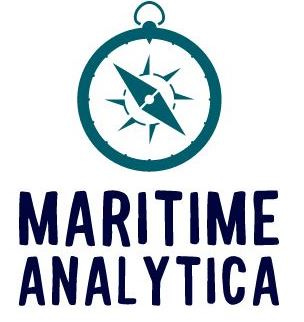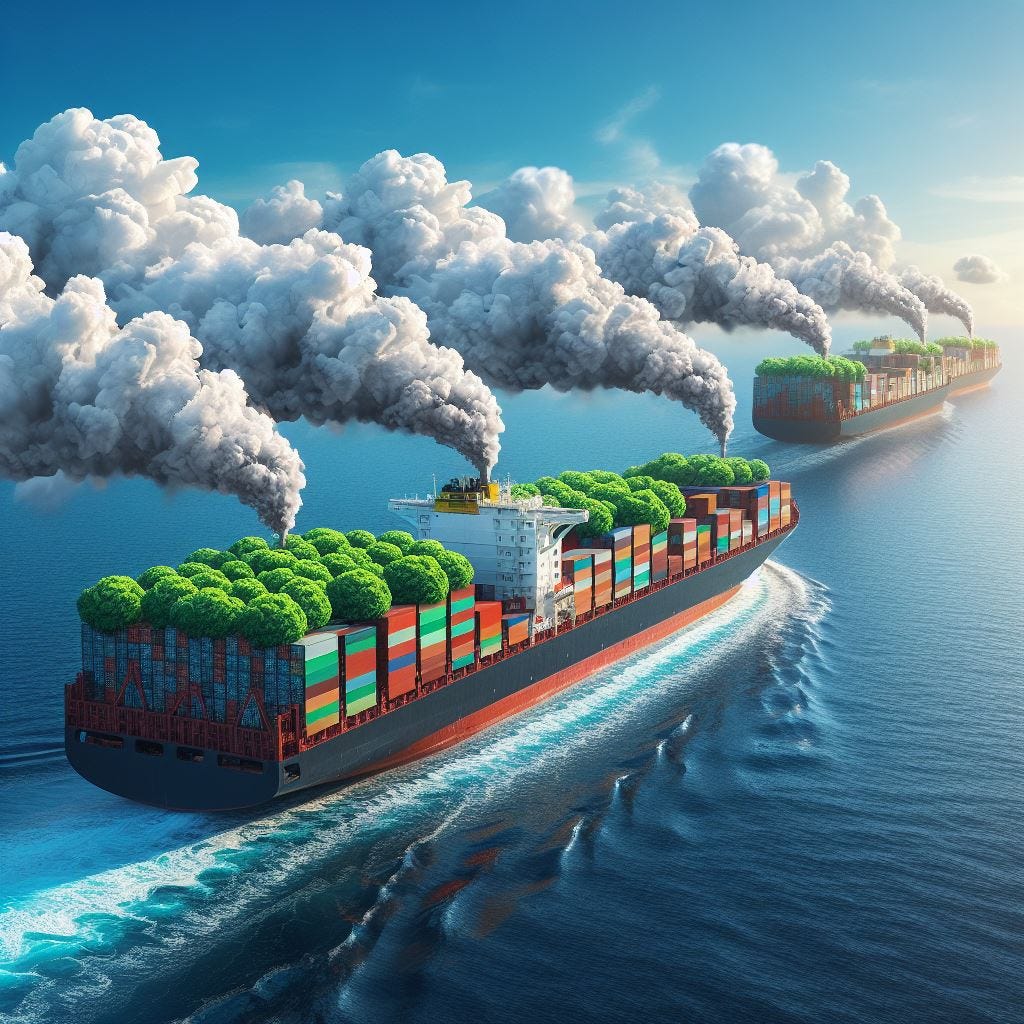🌎 The Maritime Sustainability Edition - 03
Sailing Towards a 🌿 Greener Future in Container Shipping 🚢
Hello, Maritime Mavericks! 🚢🌊
Welcome Aboard - The Maritime Sustainability Edition! 🚢🌿
Embark on a journey with us as we dive into sustainable seas. In this edition, you will explore eco-tech, green shipping, and global initiatives shaping a cleaner future for container shipping.
🚢 Maersk Methanol Mega-Ship
🌍 EU Shipping Emissions
⛽ LNG Dominance, Methanol Surge
💰 Scrubbers Savings, Environmental Concerns
📦 EU ETS & Container Shipping
💶 EU ETS Price Predictions
💲 Cost of Green Shipping
⛽ LNG for Net-Zero Shipping
🌊 Arctic Ship Noise Protection
🛣️ Alternative Fuels
Ready to sail with us? Let's make waves! 🌊
🚢 Navigating Knowledge: Container Shipping Quiz Time!
Last Edition’s Answer: Wireless Charging Platforms
1- Maersk Launches First Methanol Mega-Ship
Ane Maersk, a 16,200 TEU container ship, is the first of 18 methanol-powered vessels.
Named after Ane Mærsk McKinney Uggla, it's christened at HD Hyundai Heavy Industries.
Deployed on Maersk’s AE7 service from Asia to Europe starting February.
Maiden voyage fueled with green methanol; Maersk actively seeking green fuels for 2024-2025.
Maersk classifies green fuels based on 65-95% life cycle GHG reductions compared to fossil fuels.
2- EU Incorporates Shipping in Emissions Trading System
The EU has officially included shipping in the EU ETS to tackle carbon emissions.
A phased approach over three years will be implemented, with full coverage by 2027.
Non-compliance could result in fines and potential port call refusal.
Revenue will support maritime decarbonization via an Innovation Fund.
The EU will auction emission allowances, affecting shipowners and operating costs.
Maersk Broker Advisory Services predicts substantial cost increases, with potential carbon taxation exceeding $1.3 million for specific routes.
3- LNG Dominates, Methanol Surges
LNG is the most prevalent alternative fuel, primarily favored by CMA-CGM and MSC, representing 75% of the total fleet.
Methanol-powered containerships are gaining ground, propelled to second place by recent newbuild orders.
CMA-CGM, Evergreen, and Maersk are leading in the adoption of methanol-powered vessels, collectively holding a 77% share in this category.
4- Scrubbers Save $12B in Shipping, Spark Environmental Concerns via Sea-Intelligence
Sea-Intelligence analysis reveals $12 billion savings in container shipping due to scrubbers, focusing on the period since the 2020 global sulfur cap.
Scrubber discharge into the ocean raises environmental concerns, with studies indicating significant contaminants in water samples.
Open-loop scrubbers, predominant globally, face calls for stricter regulations on discharge water.
Despite environmental debates, over 5,400 ships (5% of global fleet) now use scrubbers.
NASA study suggests the 2020 sulfur cap has improved atmospheric conditions despite concerns.
5- EU ETS Impact on Container Shipping: Challenges
Varying values create negotiation complexities and uncertainties.
Differences in calculating 2024 emissions surcharges contribute to confusion.
Malleable carbon market complicates EU ETS surcharge impact on shipping.
Focus on all-in freight costs as emissions costs rise.
Lack of industry-wide transparency adds confusion in European shipping.
6- EU ETS Prices Forecasts
7- The Cost of Greener Shipping
8- LNG Paves the Way for Net-Zero Shipping
Maritime industry faces immediate pressure from regulations, requiring swift, practical solutions for a net-zero target by 2050.
Grey methanol, ammonia, and hydrogen emit more GHGs than traditional fuels. Grey LNG provides an immediate 23% emissions reduction, emerging as a short-term solution.
Transition to green fuels is crucial for meeting decarbonization goals, addressing supply scaling challenges.
LNG, bio-LNG, and e-LNG represent a practical and realistic route toward achieving net-zero shipping emissions.
9-Arctic Urgency: Combatting Ship Noise for Ocean Protection
Clean Arctic Alliance urges IMO action at SDC 10 for rising Arctic ship noise.
Immediate regulation needed to protect communities and marine life.
Demands include plan for IMO's Experience Building Phase and energy-efficient measures submission.
Focus on Arctic-specific noise reduction guidelines for Inuit Nunaat.
Vital step for climate and biodiversity goals, aligning with global emission reduction targets.
10- Carving the Path of Alternative Fuels via MMM Center
As we sail forward, the horizon of alternative fuel costs is poised to descend. But as the sun sets on fossil-based fuels, expect a gradual shift, rather than a swift handover of the reins.
Our industry's journey towards sustainability will unfurl a tapestry of fuels, each with its purpose, weaving a complex transition instead of a solitary victor.
We read your emails, comments, and poll replies daily. Hit reply and let us know what you want more of! - Email: maritime-analytica@outlook.com
Have you missed any past newsletter? Check them out here:
For more daily news, follow up via Linkedin here:
For more, please complete the form:



